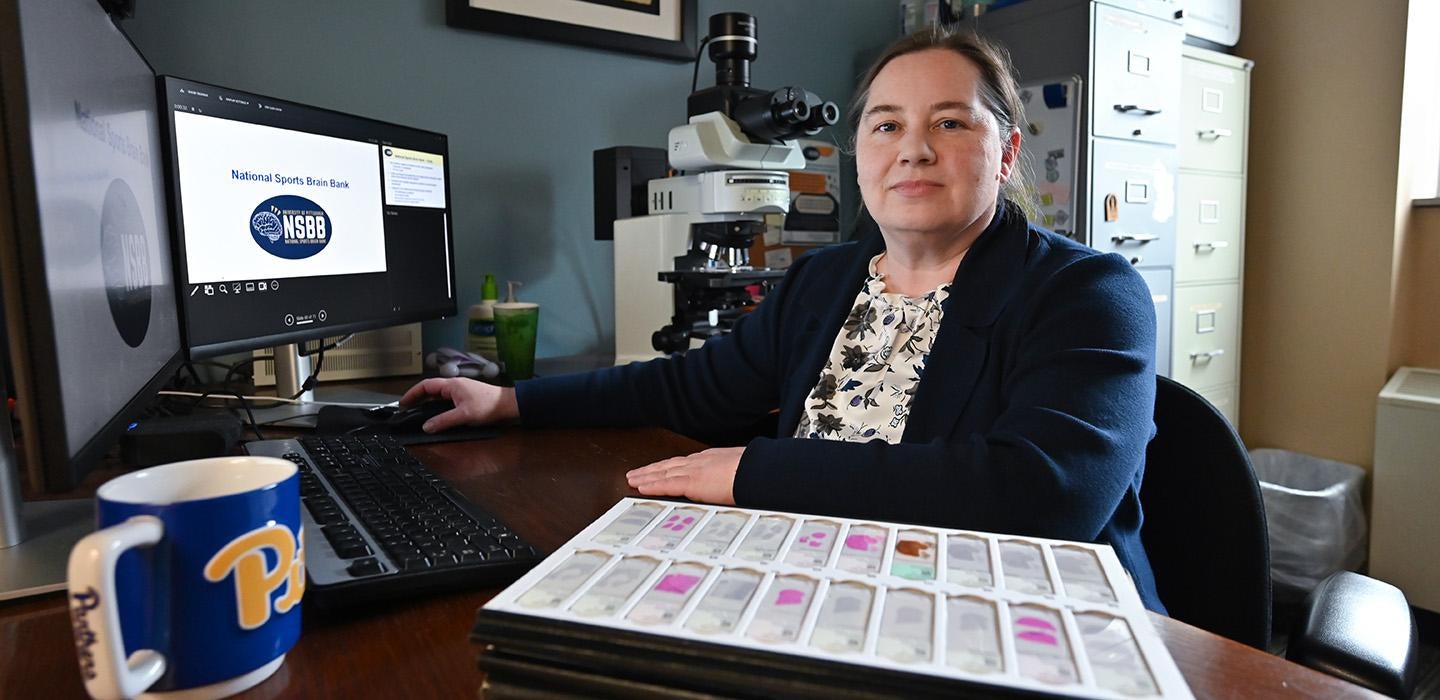
Subscribe to Pittwire Today
Get the most interesting and important stories from the University of Pittsburgh.Earlier this year, the National Sports Brain Bank (NSBB) at the University of Pittsburgh numbered around 100 registrations from people interested in fulfilling the new center’s mission. They receive annual updates regarding neurocognitive function and, ultimately, pledge to donate a brain that experienced contact sports from professional all the way to recreational levels.
Then, in February, registrations swelled within two weeks to almost 191 participants this annual Brain Awareness Week. The reason: a poignant television story and a new local champion in former KDKA-TV weatherman Jon Burnett.
“Putting a human face on the issues meant so much,” said Julia Kofler (pictured above), School of Medicine associate professor and NSBB director. “At the opening news conference last May, there were faces that people connected to, like [the Steelers’] Jerome Bettis and all. Now it’s Jon Burnett, someone in Pittsburgh who people are close to. Someone leading by example.”
The brain bank, launched in May 2023, aims to perform observational studies and brain autopsies on athletes who participated in sports with increased risks of concussions or mild traumatic brain injury that may lead to neurodegenerative diseases like chronic traumatic encephalopathy (CTE).
In the KDKA-TV story, Burnett and his family talked openly about his neurocognitive decline that a neurologist suspects — because of Burnett’s 1970s football days at the University of Tennessee — may someday be formally diagnosed under a microscope as CTE. Burnett, 70, retired five years ago from the station. But his example of participating in the NSBB registry and gracefully publicly handling his decline caused others to both support him on social media and sign up for the same study as he did.
That story was told by Burnett’s former KDKA-TV co-anchor and longtime friend Kristine Sorensen, and a few days later on Valentine’s night, she followed up with another story about that reaction. Kofler also sent a thank-you note to the Burnetts, telling them how his story inspired new participants — more than 50 in the first 48 hours — to come to the brain bank.
“Yes, that reaction was stunning,” Kofler said. “Many have followed through; a good number have consented and completed the [annual] questionnaire. We’re grateful for all who sign up. There is still so much we need to learn.”
To fulfil the intention that earned the Brain Bank grants from the Chuck Noll Foundation, The Pittsburgh Foundation and Richard King Mellon Foundation, however, the Brain Bank can’t stop there. Kofler would love nothing more than to advance the science with thousands of pledges for the study’s inventory. CTE is a widely misunderstood disease, she notes, and is often mistaken for other brain-related issues such as dementia, Alzheimer’s, tumors and even sleep disorders and depression.
Both the gradual growth in registrations from May 2023 to this winter and the sudden surge in mid-February proved helpful to the new brain bank.
“For a start, it was great,” Kofler said. “Otherwise, our team might have been overwhelmed. It was good to fine-tune the processes, because we didn’t really have any expectations and know how people would respond.
“The next few months, our efforts are to increase our outreach and get more people to sign up for the study,” she said.
— Chuck Finder, photography by Aimee Obidzinski
How you can help
At-risk athletes with or without signs of concussion can participate in the study. Register to donate to the National Sports Brain Bank.


